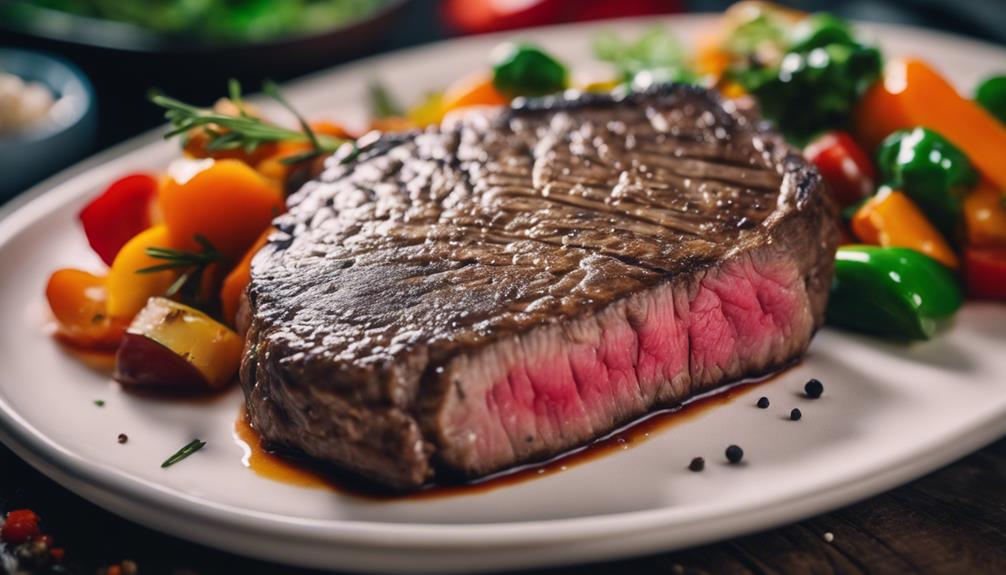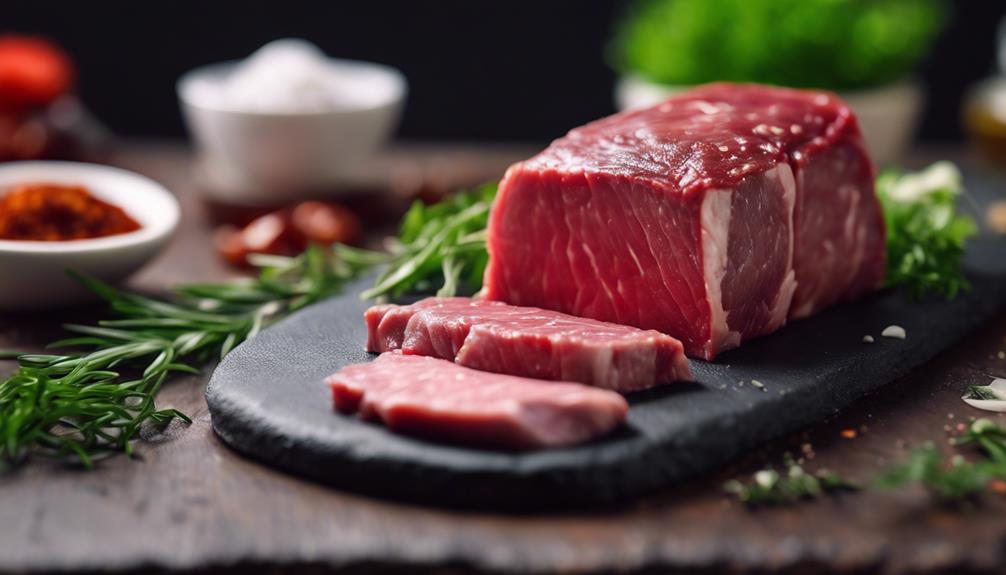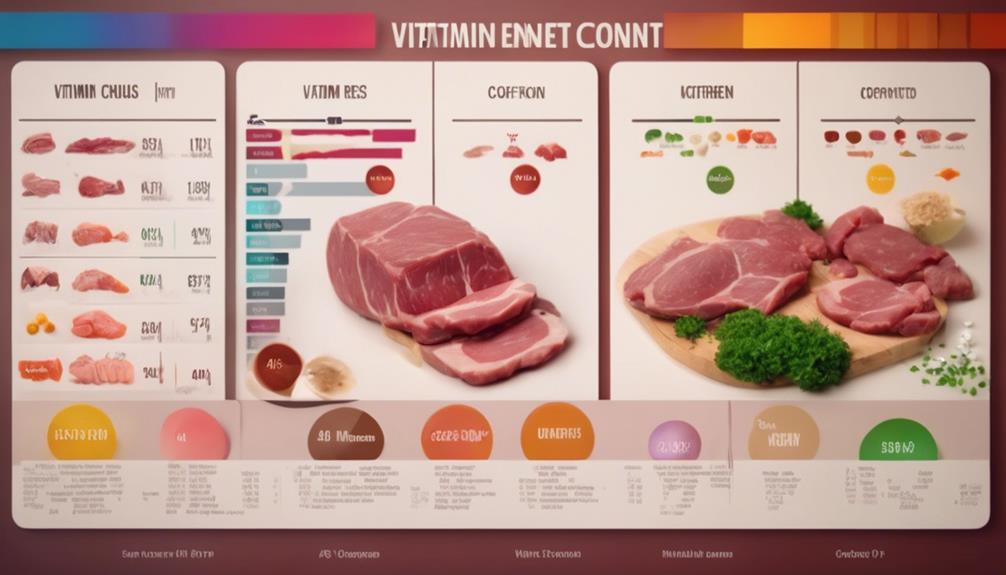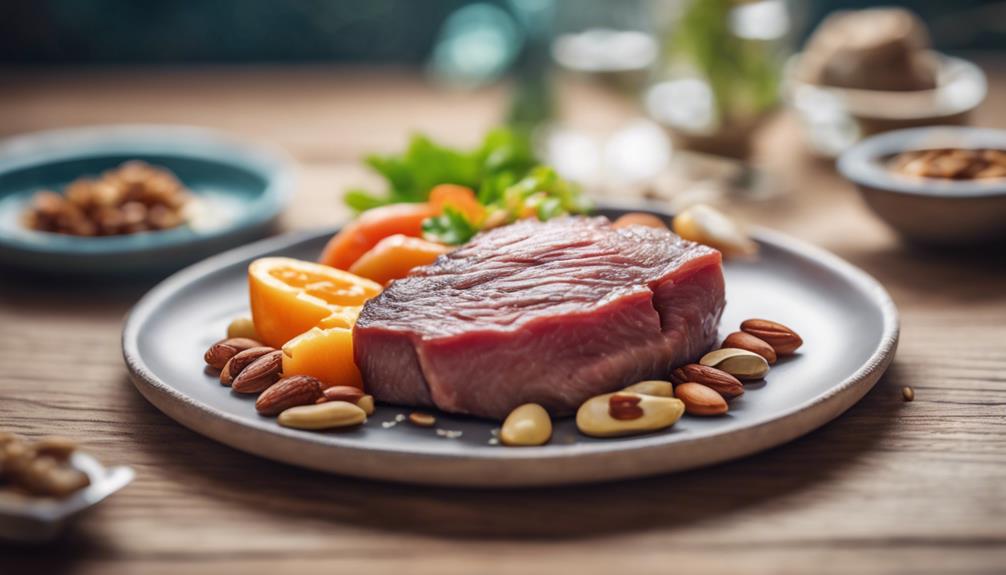
When considering your dietary choices, have you ever pondered the potential benefits of incorporating emu meat into your meals? This intriguing protein source offers a multitude of health advantages that might surprise you. From its impressive nutrient profile to the sustainable farming practices involved, there's more to the story of emu meat that awaits exploration.
Key Takeaways
- Lean, high-protein, nutrient-dense meat option
- Low in fat and calories, rich in iron, zinc, B12
- Sustainable choice with low environmental impact
- Ethical considerations for animal welfare
- Versatile and delicious for various dishes
Nutritional Profile of Emu Meat

When examining the nutritional profile of emu meat, it's evident that this protein source offers a range of health benefits. Emu meat is renowned for being lean, low in fat, and high in protein. A 3.5-ounce serving of emu meat contains approximately 110 calories, making it a great option for those looking to maintain a healthy diet while still enjoying a protein-rich meal.
Moreover, emu meat is a good source of essential nutrients such as iron, zinc, and vitamin B12. Iron is crucial for oxygen transport in the body, zinc plays a vital role in immune function and wound healing, while vitamin B12 is essential for nerve function and DNA synthesis. Including emu meat in your diet can help ensure you meet your daily requirements for these important nutrients.
In addition to being nutrient-dense, emu meat is also a great alternative for individuals with allergies to more common meats like beef or pork. Its unique flavor and texture make it a versatile option for various dishes, providing a delicious and healthy choice for your meals.
Protein Content Comparison With Other Meats
Compared to other meats, emu meat stands out for its impressive protein content and nutritional benefits. Emu meat is a lean source of protein, containing about 22-25 grams of protein per 3.5-ounce serving. This protein content is comparable to traditional meats like chicken and beef. Protein is essential for muscle growth, repair, and overall health, making emu meat a valuable addition to a protein-rich diet.
In addition to its protein content, emu meat is low in fat and calories, making it a healthier option for those looking to increase their protein intake without consuming excess fats. Emu meat is also rich in essential nutrients like iron, zinc, and B vitamins, further enhancing its nutritional profile.
When compared to other meats, emu meat offers a unique combination of high protein content and low fat, making it a desirable choice for individuals seeking a healthy and balanced diet. Incorporating emu meat into your meals can provide a delicious and nutritious alternative to traditional meat options.
Fat Content Comparison With Other Meats

Emu meat not only excels in protein content but also distinguishes itself by maintaining a remarkably low fat content when compared to other meats. This makes it a powerful choice for those seeking a leaner option without compromising on taste or nutrition. To highlight this further, let's compare the fat content of emu meat with some other common meats in the table below:
| Meat Type | Fat Content per 100g |
|---|---|
| Emu | 2g |
| Chicken | 7g |
| Beef (lean) | 8g |
| Pork (lean) | 6g |
As shown in the table, emu meat stands out with only 2g of fat per 100g, making it a standout choice for individuals looking to manage their fat intake while still enjoying a delicious meat option. This low-fat content not only contributes to a healthier diet but also offers a unique flavor profile that sets emu meat apart from traditional meat choices.
Caloric Value Comparison With Other Meats
To assess the caloric value of different meats effectively, you can compare their energy content per 100g serving. Emu meat stands out as a lean protein source with lower caloric content compared to beef, pork, and lamb. Emu meat contains approximately 110 calories per 100g serving, making it a favorable option for individuals looking to manage their caloric intake while still enjoying a meaty meal. In comparison, beef typically provides around 250 calories per 100g, pork around 280 calories, and lamb around 300 calories.
When considering caloric value, it's essential to factor in the cooking methods and additional ingredients used, as these can significantly impact the final calorie count of a dish. Emu meat's lower caloric content makes it a valuable choice for those seeking a leaner protein option without compromising on taste or nutritional value. By incorporating emu meat into your diet, you can enjoy a nutrient-dense meal while managing your caloric intake effectively.
Vitamin Content Analysis

Analyzing the vitamin content of emu meat reveals its nutritional value beyond just being a lean protein source. Emu meat is a rich source of various vitamins that are essential for your overall health. Here's a breakdown of the key vitamins found in emu meat:
| Vitamin | Function | Amount per 100g |
|---|---|---|
| Vitamin B12 | Essential for nerve function and DNA | 1.2 mcg |
| Vitamin B6 | Helps in brain development and function | 0.4 mg |
| Vitamin E | Acts as an antioxidant | 0.3 mg |
These vitamins play crucial roles in maintaining your body's functions, from nerve health to antioxidant protection. Including emu meat in your diet can help you meet your daily vitamin requirements. However, it's essential to remember that a balanced diet with a variety of foods is key to ensuring you get all the necessary vitamins and minerals for optimal health.
Mineral Content Analysis
Examining the mineral composition of emu meat provides valuable insights into its nutritional profile and health benefits. Emu meat is a rich source of essential minerals that are vital for overall health. A 100-gram serving of emu meat typically contains significant amounts of iron, zinc, phosphorus, and potassium. Iron is essential for oxygen transport in the body, while zinc plays a crucial role in immune function and wound healing. Phosphorus is important for bone health and energy production, and potassium is necessary for maintaining proper fluid balance and muscle function.
These minerals in emu meat can contribute to meeting your daily nutritional requirements. Incorporating emu meat into your diet can help ensure an adequate intake of these essential minerals. However, it's important to note that individual mineral needs may vary based on factors such as age, gender, and activity level. Therefore, it's recommended to consult with a healthcare provider or nutritionist to determine the optimal mineral intake for your specific needs.
Omega-3 and Omega-6 Fatty Acids

Understanding the role of omega-3 and omega-6 fatty acids in emu meat consumption can provide valuable insights into its potential health benefits for individuals seeking a well-rounded diet. Emu meat is a good source of both omega-3 and omega-6 fatty acids, essential nutrients that play crucial roles in maintaining overall health. Omega-3 fatty acids are known for their anti-inflammatory properties and are essential for brain function and heart health. On the other hand, omega-6 fatty acids are important for skin and hair growth, as well as supporting bone health. Achieving a balance between these two types of fatty acids is key for optimal health.
| Omega-3 and Omega-6 Fatty Acids | Role in Emu Meat Consumption |
|---|---|
| Omega-3 | Anti-inflammatory, brain function, heart health |
| Omega-6 | Skin and hair growth, bone health |
Potential Health Benefits
Exploring the potential health benefits of incorporating emu meat into your diet can offer valuable insights into its positive impact on overall well-being.
Emu meat is a nutrient-dense protein source that provides several health benefits:
- High Protein Content: Emu meat is a rich source of protein, essential for muscle building, tissue repair, and overall body function. It can be a valuable addition to your diet, especially for individuals looking to increase their protein intake.
- Low in Fat: Emu meat is lean and low in saturated fats, making it a heart-healthy choice. By opting for emu meat, you can enjoy a delicious protein source without worrying about excessive fat consumption.
- Rich in Vitamins and Minerals: Emu meat contains essential vitamins like B12, iron, and zinc, which are crucial for various bodily functions. Incorporating emu meat into your meals can help meet your daily nutrient requirements and support your overall health.
Consider adding emu meat to your diet as part of a balanced and healthy eating plan to reap these potential health benefits.
Considerations for Cooking and Preparation

When cooking emu meat, it's important to consider optimal preparation methods to enhance both flavor and nutritional value. Emu meat is a lean protein source that can benefit from various cooking techniques. To maximize flavor, consider marinating the meat before cooking to add moisture and tenderness. Emu meat can be grilled, roasted, or pan-seared to perfection. These methods help retain the meat's natural juices and ensure a delicious dining experience.
To preserve the nutritional value of emu meat, avoid overcooking, as this can lead to a loss of nutrients. Emu meat is best served medium-rare to medium to maintain its tenderness and health benefits. Additionally, pairing emu meat with a variety of herbs, spices, and vegetables can enhance its overall nutritional profile.
When preparing emu meat, remember to handle it safely to prevent cross-contamination. Ensure that the meat reaches the recommended internal temperature to guarantee food safety. By following these cooking and preparation considerations, you can enjoy the unique flavors and health benefits of emu meat in every bite.
Environmental Sustainability of Emu Farming
Emu farming practices play a crucial role in ensuring the environmental sustainability of this industry. When managed correctly, emu farming can have positive impacts on the environment. Here are three key points to consider:
- Land Preservation: Emus require less land compared to traditional livestock, such as cattle or sheep. Their grazing patterns are less destructive, allowing for better land preservation and reduced soil erosion.
- Water Conservation: Emus are known to be more water-efficient than other livestock animals. They consume less water per pound of meat produced, making them a more sustainable option in regions where water scarcity is a concern.
- Reduced Greenhouse Gas Emissions: Emus produce lower methane emissions compared to cattle. By choosing emu meat, you're supporting a more environmentally friendly option that contributes to reducing greenhouse gas emissions.
Ethical Considerations in Emu Meat Consumption

Considering the ethical implications of consuming emu meat is essential for making informed choices about your dietary preferences. Emus are sentient beings, and how they are raised and treated before being processed for meat is a crucial consideration. Here are some key ethical considerations to ponder:
| Ethical Considerations | Description |
|---|---|
| Animal Welfare | Emus should be raised in conditions that prioritize their well-being, including access to space, food, and healthcare. |
| Slaughter Practices | The methods used for slaughtering emus should be humane, minimizing pain and distress to the animals. |
| Environmental Impact | Consider the broader impact of emu farming on the environment, such as land use, water consumption, and waste management practices. |
Conclusion and Final Thoughts
To make well-informed decisions about consuming emu meat, it's important to reflect on the ethical considerations surrounding animal welfare, slaughter practices, and environmental impact.
When considering whether to include emu meat in your diet, keep the following points in mind:
- Animal Welfare: Emus are typically raised in free-range environments, allowing them to exhibit natural behaviors. However, ensuring that these animals are treated humanely throughout their lives is crucial. Look for producers who prioritize animal welfare standards.
- Slaughter Practices: The methods used to slaughter emus can significantly impact the ethical implications of consuming their meat. Opt for producers that employ humane slaughter techniques to minimize suffering.
- Environmental Impact: Emu farming can have varying environmental effects depending on farming practices. Assess the sustainability of the farm's operations, such as land use, water consumption, and waste management, to make an environmentally conscious choice.
Frequently Asked Questions
Can Emu Meat Be Safely Consumed Raw?
You should not consume emu meat raw as it may pose health risks. Cooking emu meat thoroughly kills harmful bacteria, reducing the chance of foodborne illnesses. Prioritize safety by ensuring proper cooking temperatures are reached.
Are There Any Known Allergies Associated With Emu Meat?
Like the sun rising each day, you may wonder about allergies linked to emu meat. Emu meat is not commonly associated with allergies, but individual reactions can occur. Consult with a healthcare provider for clarity.
What Is the Recommended Portion Size for Emu Meat?
For emu meat, the recommended portion size is about 3 to 4 ounces per serving. This lean protein source can be a healthy addition to your diet. Enjoy it grilled or sautéed for a nutritious meal.
How Does the Taste of Emu Meat Compare to Other Meats?
When comparing the taste of emu meat to other meats, you'll find it has a unique flavor profile. Emu meat is often described as lean, slightly gamey, and reminiscent of beef or venison, making it a distinctive culinary experience.
Are There Any Religious Dietary Restrictions Related to Emu Meat Consumption?
When it comes to religious dietary restrictions, you might want to check if your faith has any guidelines on emu meat consumption. Different religions have varying rules regarding food, so it's wise to be informed.
Conclusion
In conclusion, when it comes to choosing a healthy and sustainable meat option, emu meat stands out as a nutritious choice. With its high protein, low-fat content, and essential vitamins and minerals, it provides a well-rounded option for health-conscious individuals.
Additionally, its environmentally sustainable production methods and ethical considerations make it a 'feather in the cap' of conscious consumers looking to make a positive impact on their health and the planet. Consider adding emu meat to your diet for a unique and beneficial culinary experience.




